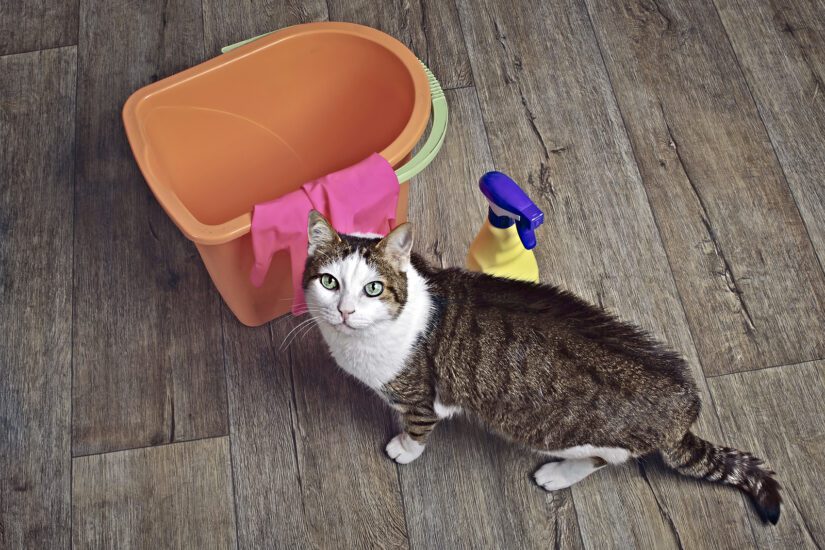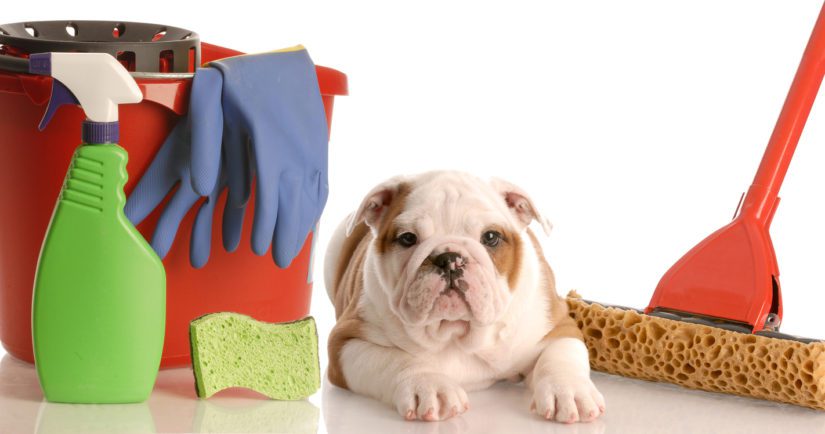It’s time to tackle that list of springtime chores. But did you know that many household cleaning products contain chemicals that can be toxic to your pet? The following list of toxic products are ones to be aware of when an animal is around.

Keep your pet safe from the following cleaning products:
- Alkaline substances. A broad term for substances called “bases” (bleach being one), pets who ingest or are exposed to products that fall into this category can experience skin irritation, eye irritation, gastrointestinal signs (vomiting and diarrhea) and occasionally respiratory irritation (wheezing or coughing). Examples of alkaline products include automatic dishwasher detergents, oven cleaners, lye, and industrial pipe and drain cleaners.
Tip: Many bases have a strong smell or taste that isn’t interesting to pets, but some can be near odourless or have subtle taste, making excessive exposure more likely. Make sure you keep cleaning products safely stored where pets don’t have access.
- Ammonia. Another popular alkaline cleaning product, ammonia is highly toxic for your pet, causing irritation and burning to the throat, nose, stomach and respiratory tract. Ammonia is commonly found in window cleaners, stainless steel cleaners, oven cleaners and floor solutions.
Tip: Most pets will smell strong chemicals like ammonia and choose to stay away while you’re cleaning. But if you’ve got a pet who likes to stay by your side and you’re using ammonia-based products, particularly sprays, keep your pet occupied in another room until you’re done.
- Bleach. A common household cleaner, bleach (chlorine) can cause vomiting, diarrhea, internal burns and even seizures if ingested by your pet. Inhaling chlorine fumes can also lead to respiratory illness. Bleach is commonly found in toilet bowl cleaners, cleaning and scouring powders, mildew removers, all-purpose cleansers, dishwashing detergent and laundry soap.
Tip: Immediately wipe down any surfaces you bleach with a damp cloth, and make sure pets don’t have access to water sources where you use bleach (i.e. keep the lid on the toilet down).
- Phthalates. Phthalates are the chemicals used to create the pleasing fragrances in cleaning products. But while the scents may be pleasing, the effects are not. Studies have shown that phthalates can cause liver, testicular and pancreatic tumours in animals because they disrupt the hormonal system. Phthalates are found in a range of all-purpose cleaners and deodorizing products.
Tip: Check your plug-in and spray air fresheners to see if they contain phthalates and consider switching to a phthalate-free alternative. If your pet has a tendency to make plug-in air fresheners a toy, move them to outlets on counters or other out-of-reach locations.
- Ethylene glycol (anti-freeze): While not a cleaning product, ethylene glycol is found around the home and is highly toxic and fatal to pets. You might come across your supply of anti-freeze while doing some Spring cleaning and post-winter car tune-ups, or spot a also leak from your car radiator. It doesn’t take much for a pet to become sick, and unfortunately it tastes sweet, so animals often choose to eat it. Pet’s show signs immediately after ingestion which can include, lethargy, vomiting, excessive salivation, and possible seizures. The last stage of intoxication is when animals urinate very little or not at all. If you think your pet has been exposed to ethylene glycol, take them to the emergency room immediately.
Tip: Make sure your antifreeze is safely stored and locked away from your pets. Check the container to make sure there are no cracks or leaks, and if any spills while using, clean up immediately. Always ask for pet-safe propylene-based antifreeze instead of ethylene glycol-based anti-freeze.
When getting your home ready for Spring, look for pet-safe cleaning products or consider using alternative ingredients such as vinegar, baking soda and lemon juice.
Should you suspect your pet has ingested something toxic, call your veterinarian or an emergency veterinary clinic immediately. How quickly treatment is started can mean the difference between life and death.

Extra Resources:
- Toxic for dogs: What to avoid feeding Fido
- Toxic for cats: What to avoid feeding your feline
- Aromatherapy and your pets: what you need to know
- Is Peanut Butter toxic for dogs?
Get updates from the BC SPCA
Want to receive more pet tips like this, right in your inbox? Use the form below to subscribe for updates.
